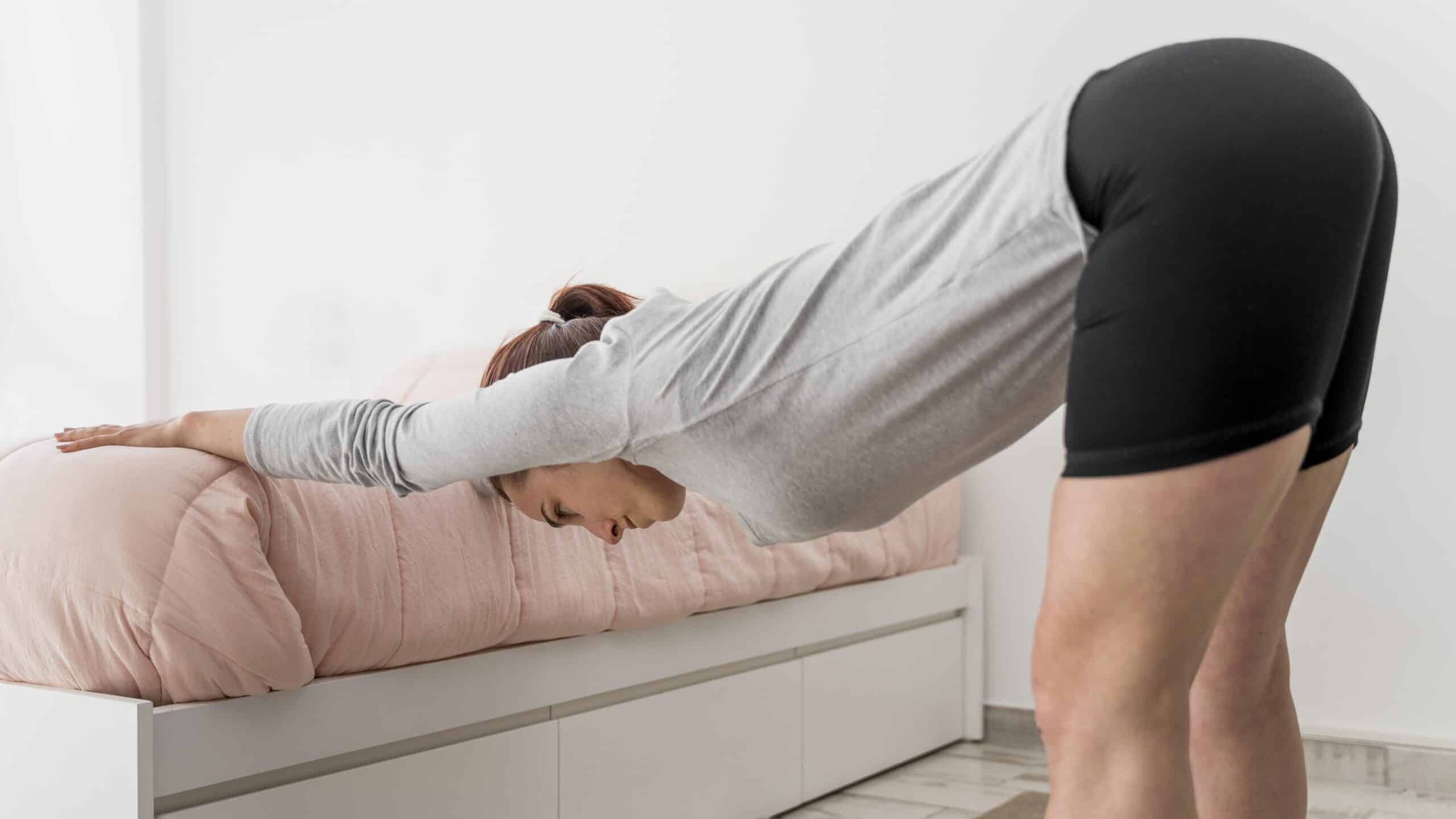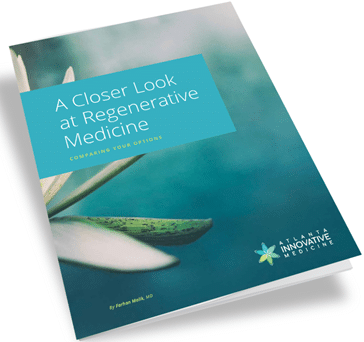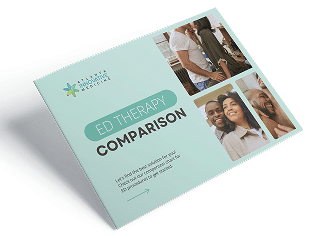By Farhan Malik, MD
Atlanta Innovative Medicine
It’s finally time—the day is done, the to-dos are checked, and you’re ready to climb into your comfortable, oh-so-welcoming bed for a great night of sleep, only to be thwarted by back pain upon lying down.
For some, lying down can trigger or worsen back pain, turning what should be a restorative experience into an uncomfortable ordeal. Instead of screaming into your pillow, “Why does my back hurt when I lie down? Why now? Why me?” keep reading.
In this article, we’ll explore the various reasons why back pain can worsen when lying down, such as mattress type, spinal alignment, or underlying conditions, and we’ll dive into what you can do about it, from home remedies to seeking professional medical help.
Why Back Pain Feels Worse Lying Down
You’re not imagining it—there are some fundamental reasons behind why back pain can often feel worse lying down at night. Lying down can sometimes exacerbate back pain due to poor spinal alignment, improper mattress support, poor posture throughout the day, or certain medical conditions. When the spine is not appropriately supported, or when underlying issues like inflammation are present, discomfort can increase, making rest a challenge.
But there’s even more to it than that.
When we rest, several physiological factors can make pain more intense: hormone levels like cortisol, the body’s natural anti-inflammatory hormone, are lower at night, which can heighten pain sensitivity. Blood flow to the spine and joints can also decrease, making discomfort seem worse. Additionally, for conditions like arthritis, inflammation can actually increase overnight as part of the body’s healing process.
A better night of sleep is one click away. Schedule a free consultation with our back pain specialists and discover your path to relief.
Beyond these internal factors, environmental elements also play a role. Darkness and quietness can make us more aware of pain, giving it a heightened presence when we’re trying to rest. All of these factors combined can make sleep a challenge for those dealing with back pain.

Causes of Nighttime Back Pain
The reason backs often hurt more at night boils down to how our bodies are supported (or not), and how various factors come into play when we try to relax and settle in for sleep. Let’s take a closer look at some common causes of nighttime back pain:
Mattress Type and Support: The type of mattress you sleep on plays a critical role in your spinal health. When you lie down, your spine relies heavily on your mattress and pillows to stay aligned. If your mattress is too soft or too firm, it can fail to support your natural curves, causing your muscles and joints to work harder to maintain proper posture. Over time, poor support can lead to increased inflammation or nerve compression, making your back pain feel worse.
Spinal Alignment and Sleep Positions: The position in which you sleep significantly affects spinal health. Poor alignment during the night can lead to strained muscles and increased pressure on the spine, exacerbating back pain. The goal is to find a position, preferably on your back or side, that supports the natural, S-shaped curvature of your spine.
Prolonged Sitting or Poor Posture: Prolonged sitting or poor posture during the day also sets the stage for nighttime discomfort. When you sit all day—especially if it’s in a hunched or awkward position—your muscles and vertebrae become strained. That tension can build up, and during sleep, your body may struggle to release or realign the stresses it accumulated throughout the day, amplifying your pain.

Medical Issues: When you lie down, underlying issues or injuries involving your back may become more apparent or aggravated, especially if inflammation or nerve irritation is involved. Conditions such as degenerative disc disease, arthritis, or spinal stenosis can cause back pain to worsen at night, and muscular issues or injuries may also become more noticeable when you rest.
Tips to Reduce Back Pain While Lying Down: Achieving Restorative Sleep and Relief
Back pain that flares up during sleep can be incredibly disruptive, affecting both your rest and your overall health. Fortunately, there are several strategies you can adopt to minimize discomfort and promote healthy spinal alignment.
Build a Foundation for Spinal Support with the Right Mattress and Pillow
The foundation of good sleep starts with your mattress and pillow. A mattress and pillow that are too soft, too hard, or lumpy can aggravate back pain by failing to support your spine’s natural curves, leading to misalignment and strain.
Choose the Right Mattress:
- Supportive and Firm, Yet Comfortable: While firmness preferences vary, look for a mattress that provides consistent support without sacrificing comfort. Memory foam, latex, or hybrid mattresses often offer good pressure relief and support for spinal curves.
- Evaluate Your Current Mattress: If your mattress is sagging, lumpy, or more than 7-10 years old, it may be time for a replacement. A well-chosen mattress can distribute weight evenly and reduce pressure points. (Hot tip: there are usually some great Black Friday and other holiday deals on mattresses, so if you need an upgrade, be on the lookout for sales!)
Pillow Support:
- Use a pillow that keeps your head and neck aligned with your spine. For back sleepers, a thinner pillow or a cervical pillow works well, while side sleepers benefit from a thicker, contouring pillow to fill the space between their ear and shoulder.

Take Steps to Manage Symptoms Before You Lie Down
Effectively addressing back pain involves more than just support while you sleep—it requires a proactive approach throughout your day.
Pain Management Techniques
- Over-the-Counter Pain Relief: NSAIDs can offer temporary relief for back pain. Always consult with your doctor before using these medications to ensure they’re appropriate for your situation.
- Non-Invasive Therapies: Explore options like regenerative treatments or physical therapy, which are designed to reduce inflammation, promote healing, and alleviate nerve irritation.
Stretching and Mobility Exercises
- Daily Stretching Routine: Engage in gentle stretches throughout the day, focusing on flexibility and mobility, particularly if you spend long periods sitting. Stretching helps prevent joint stiffness and reduces the risk of nerve compression.
- Pre-Bedtime Stretches: Before settling into bed, perform light stretching exercises for the neck and back. These gentle movements can help relieve muscle tightness and tension, making it easier for you to relax and experience a more restful sleep.

Activity Recommendations and Lifestyle Adjustments
- Limit Straining Activities: Avoid repetitive overhead movements and high-impact exercises, especially during flare-ups, as these can exacerbate symptoms.
- Posture Awareness: Maintain good ergonomic practices throughout the day. Sit with your feet flat on the floor, keep your back straight, and take frequent breaks to walk, stretch, and realign your spine.

Subscribe for Expert Insights and Our Ebook
A Closer Look at Regenerative Medicine: Comparing Your Options Learn about treatment options like Platelet Rich Plasma (PRP), Prolozone Therapy, and Stem Cell Therapy.
Best Sleep Positions for Back Support: Find Your Ideal Sleep Posture
Your sleep position significantly influences back comfort and nerve health. Here are the optimal choices for supporting your spine, and what you can do if they aren’t your preferred sleeping positions.
Sleeping on Your Back:
- This position allows for the most natural spinal alignment. Use a supportive cervical pillow or place a rolled towel behind your neck to maintain the neck’s curve and reduce nerve pressure.
- You can also put a pillow under your knees to help flatten your lower back curve and distribute pressure evenly.

Sleeping on Your Side:
- Side sleeping can be excellent for people with back pain, provided your neck and spine remain aligned.
- Use a contoured or orthopedic pillow that supports the neck’s natural curve.
- Placing a pillow between your knees will help keep your hips, pelvis, and spine aligned, reducing tension along the lower back.
Avoid Stomach Sleeping:
- Sleeping on your stomach can twist your neck and increase strain on your cervical spine, often worsening nerve compression and back pain.
- If you’re a stomach sleeper, consider gradually transitioning to a back or side sleeping position to achieve better support for your spine. Utilizing pillows strategically, such as placing them under the neck or using a body pillow, can ease this transition. A U-shaped body pillow is also a great option to provide comfort and alignment as you adjust to your new sleeping position.
When to Seek Medical Help for Back Pain While Lying Down
While making adjustments to your sleep habits and environment can significantly help reduce back pain and improve your rest, there are times when pain persists despite your best efforts. If your discomfort continues night after night, or if it worsens over time, it’s important to listen to your body and seek professional help.
Additionally, be on the lookout for other concerning symptoms such as numbness, tingling, weakness, or problems with bladder or bowel control. These can be signs of serious underlying issues that require prompt diagnosis and treatment.
Back Pain Treatment at AIM
Our orthopedic team at Atlanta Innovative Medicine specializes in spinal health, utilizing advanced diagnostics to accurately identify the root causes of your pain. We then develop personalized treatment plans tailored to your specific needs. These plans often incorporate regenerative therapies such as PRP, prolozone therapy, prolotherapy, and stem cell therapy, all designed to promote tissue repair and reduce inflammation. We also offer physical therapy and chiropractic care, aiming to resolve underlying issues so you can achieve lasting relief and enjoy restful sleep.
If sleep-related back pain continues to disrupt your nights and affect your quality of life, let this be your sign to reach out. Our team of specialists is here to help you find safe, effective, and minimally invasive solutions that are right for you.
Schedule a consultation today and take the first step to pain-free nights with healthier, more restorative sleep. Remember, persistent back pain during sleep isn’t something you have to accept lying down!
Quizzes
Are you a candidate for Regenerative Medicine?
Regenerative medicine can be an effective therapy and treatment option for lasting pain relief for a variety of conditions like osteoarthritis of the knee, hip or shoulder; ACL or meniscus tears; tennis or golfer’s elbow; chronic neck and back pain; and more.
Is it right for you and your condition? Take 1 minute to answer a few “yes or no” questions that help to assess if you might be a candidate for PRP, stem cell or other nonsurgical regenerative treatments.
Are You a Stem Cell Candidate for Your Joint or Spine Damage?
Are you a candidate for Platelet Rich Plasma (PRP) Therapy?
Do I have nonsurgical options for my injured or aging joints?
Take the Pain Medications Risk Quiz

Regenerative Medicine.
Reimagined
- Advanced hybrid therapies, including Mesenchymal Stem Cell therapy combined with different mechanisms of action that synergistically come together to support ultimate healing
- More powerful PRP that’s customized, amplified and personalized
- Therapies delivered by an experienced, compassionate team comprised of multidisciplinary experts in traditional and alternative medicine working as your team: Medical Doctors, Nurse Practitioners, Physiotherapists and Chiropractors
- Advanced training through the American Academy of Orthopedic Medicine, the American Osteopathic Association of Prolotherapy Regenerative Medicine, and more
All content of this page is for informational purposes only and is not intended to serve as a substitute for the consultation, diagnosis, and/or medical treatment of a qualified physician or healthcare provider. Individual results may vary. Your medical professional can explain all the risks and potential benefits of any therapy based on your specific circumstances. At this time regenerative therapies are not FDA approved. Neither Atlanta Innovative Medicine nor its physician affiliates promise regenerative therapies as a cure for any condition, disease, or injury.
Other Atlanta Areas We Service:
© 2024 Atlanta Innovative Medicine, LLC. All Rights Reserved. AIM Scholarship Opportunity








